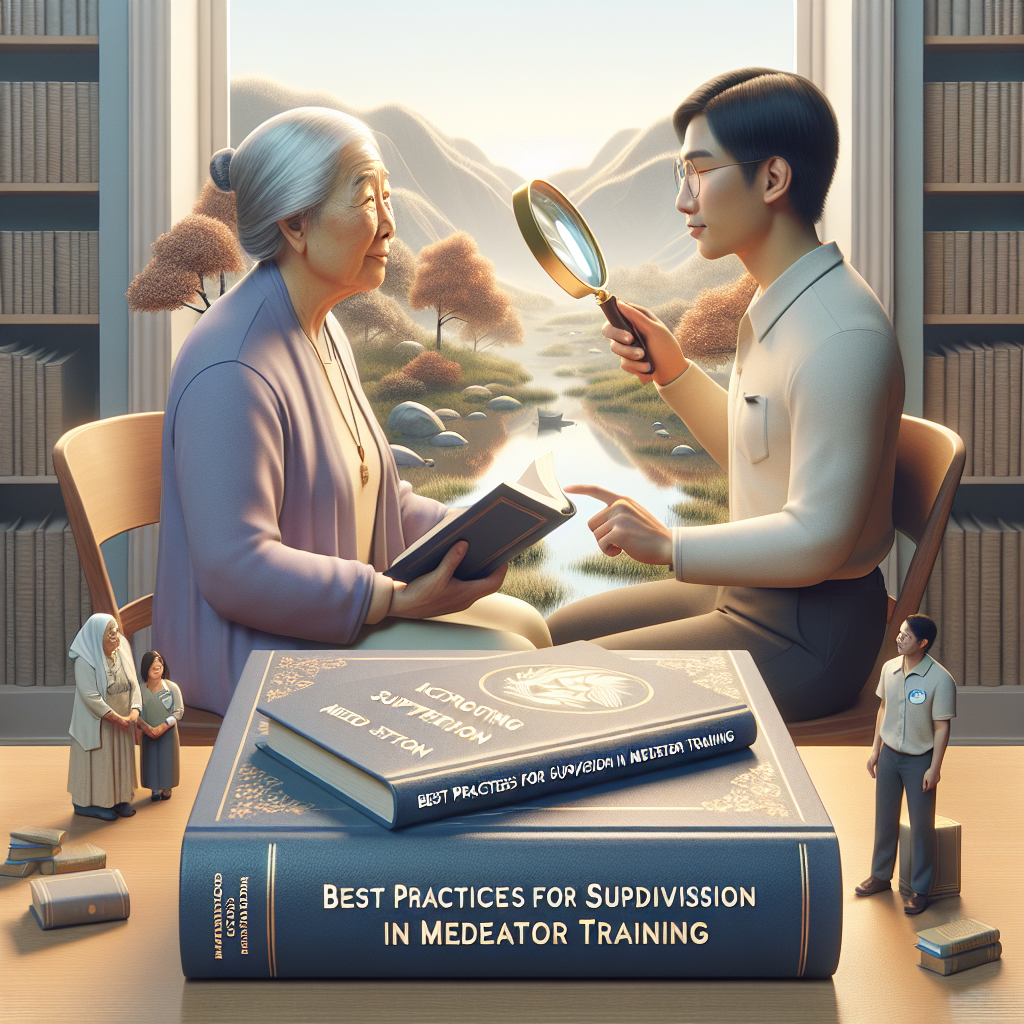Utilizing Supervision in Mediator Training
Maximizing Mediator Training: Effective Supervision Techniques
Introduction to Effective Supervision in Mediator Training
Effective supervision plays a critical role in mediator training, ensuring that mediators have the necessary skills and support to successfully facilitate conflict resolution. Mediation is a complex process that requires a combination of communication, negotiation, and problem-solving skills. Without proper supervision, mediators may struggle to effectively navigate difficult situations and maintain professionalism.
Understanding the Role of a Mediator
Before discussing the importance of supervision in mediator training, it is important to have a clear understanding of the role of a mediator. A mediator is a neutral third-party who facilitates communication and negotiations between conflicting parties. Mediators do not make decisions or take sides, but rather help parties find mutually agreeable solutions.
The role of a mediator requires a unique set of skills, including active listening, empathy, conflict resolution, and critical thinking. It is also important for mediators to remain impartial and neutral throughout the mediation process.
Importance of Supervision in Mediator Training
Supervision is a crucial component of mediator training as it provides mediators with guidance, support, and feedback on their skills and performance. It also allows mediators to reflect on and improve their techniques, ensuring they are prepared for any challenges that may arise during a mediation session.
Supervision can also help mediators develop leadership skills and enhance their ability to establish trust and rapport with participants. Through supervision, mediators can learn from experienced professionals and gain valuable insights into the mediation process.
Essential Skills for Effective Mediation
Effective mediation requires a combination of skills and techniques that can be learned and developed through training and supervision. Some essential skills for successful mediation include:
- Active Listening: Mediators must be able to listen actively and attentively to the concerns and perspectives of all parties involved in a conflict. This includes listening to both verbal and nonverbal communication.
- Empathy: Mediators should be able to understand and empathize with the feelings and perspectives of all participants, without taking sides or showing bias.
- Conflict Resolution: Mediators must have a strong understanding of conflict resolution techniques and be able to guide parties towards mutually beneficial solutions.
- Critical Thinking: Mediators should have strong critical thinking skills to help them analyze and understand complex situations and effectively facilitate discussions.
Building and Maintaining Rapport with Participants
A key aspect of effective mediation is the ability to build and maintain rapport with all participants. This requires mediators to establish trust, create a safe and comfortable environment, and communicate effectively with all parties.
Supervision can help mediators develop their interpersonal skills and learn how to build rapport with different types of individuals. Through role-playing and feedback, mediators can improve their ability to connect with participants and create a positive and productive mediation environment.
Dealing with Conflict and Difficult Situations
Conflict is an inevitable part of mediation, and mediators must be prepared to handle difficult situations and emotions. Through supervision, mediators can learn how to defuse tense situations, address conflicts, and handle strong emotions such as anger, frustration, and grief.
Supervision can also provide mediators with strategies for managing power imbalances and dealing with difficult personalities. This can help mediators maintain control and keep the mediation process on track.
Strategies for Effective Communication
Communication is a critical component of mediation, and mediators must be skilled at facilitating effective communication between parties. Through supervision, mediators can learn how to ask open-ended questions, paraphrase and reframe statements, and encourage active listening.
Supervision can also help mediators develop their nonverbal communication skills, such as body language and tone of voice. These skills can help mediators create a positive and productive atmosphere during mediation sessions.
Ethics and Professionalism in Mediation
Mediators must adhere to high ethical standards and maintain professionalism throughout the mediation process. This includes maintaining confidentiality, avoiding conflicts of interest, and remaining neutral and impartial.
Through supervision, mediators can learn about ethical best practices and how to navigate challenging ethical situations. Supervision can also help mediators reflect on their own biases and beliefs, ensuring they do not impact the mediation process.
Preparing for Different Types of Mediation Sessions
Supervision can also help mediators prepare for different types of mediation sessions, such as family disputes, workplace conflicts, or community conflicts. Through role-playing and feedback, mediators can develop their skills and techniques for different types of conflicts, ensuring they are well-equipped to handle any situation that may arise.
Measuring Success and Continued Growth in Mediation Skills
Finally, supervision can help mediators measure their success and continued growth in their mediation skills. Through regular check-ins and evaluations, mediators can receive feedback on their performance and identify areas for improvement.
Supervision also allows mediators to reflect on their progress and set goals for continued growth and development. This can help mediators become more effective and confident in their role as a mediator.




